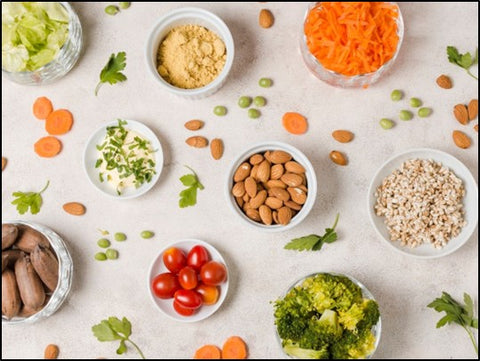
Our family has been on the Mediterranean Diet since forever. Along the years I’ve learned, tested and educated myself about many of the diet plans around, and I always kept coming back to the Mediterranean Diet. It is the most balanced diet plan and has been proven to be healthy and sustainable for years. It makes me feel healthy and strong and brings me joy in preparing, cooking and eating the food.
What is the Mediterranean Diet?
The Mediterranean Diet is a nutrition plan based on the eating patterns in countries around the Mediterranean Sea.
It is a healthy diet, but most of all it is a balanced, non-crazy diet. It has been around for ages, and it has been linked to a healthier life and longer life expectancy in multiple studies. You’ll hear the words “in moderation” mentioned a lot in relation to the Mediterranean Diet. And it is what it is. No need to carry a kitchen scale around with you, no measuring spoons, just learn the principles, listen to your body and follow your common sense.
Principles of the Mediterranean Diet:
- Consume healthy fats, plant-based and preferably monounsaturated fats – olive oil, nuts & seeds (raw or lightly toasted), tahini and avocados are healthier sources of fat.
One of the revolutionary changes the Mediterranean Diet brought about was the focus on consuming high quality fats, rather than strictly limiting fats consumption as in low-fat diets. It’s not the quantity so much as the quality of fats you consume that affects your life expectancy and reduces risk of coronary heart disease. This doesn’t mean an unlimited consumption of fat, of course. Depending on specific countries around the Mediterranean, the daily portion of fats ranges between 25%-40% fats of the daily food consumption, however this consumption is almost solely based on healthier sources of fat.
style="text-align:justify;"Olive oil is one of the staples of the mediterranean kitchen, for many reasons:
- It consists mostly monounsaturated fats, which can lower risk of heart disease and strokes (SOURCE:AMERICAN HEART ASSOCIATION)
- It’s a source for Vitamin E and other antioxidants
- It improves blood Cholesterol levels, reducing risk of coronary heart disease
- It’s tasty and adds flavor and happiness to food!
- Increase consumption of plant-based foods – vegetables, legumes and whole-grains: plant-based foods are the foundation of the Mediterranean Diet.
- Vegetables – how many should you eat a day? 5 a day is a good start, but once you’ll learn some of our Mediterranean salad recipes, you’ll see 5 is just a start. If you vary the colors, add olive oil and a portion of either protein, legume or grain, your salad is now the main course. Vegetables are also one of the tastier ways to season and spice up your food – use onions, garlic and herbs (rich in antioxidants) to add flavor.
- Legumes – a healthy source of protein and dietary fibers, legumes include all types of beans, lentils, peas and chickpeas.
- Grains, and mostly whole-grains – rye, whole wheat, bulgur, couscous, oats, rice, quinoa and more are healthy grains and are widely used in the Mediterranean kitchen. Grains are considered “whole” when they contain 100% of the kernel, thus providing all the essential nutrients unprocessed grains have to offer. (SOURCE: WHOLE GRAINS COUNCIL

- Moderate consumption of animal-based protein: the Mediterranean diet is based on lean sources of protein, consumed in moderation. Such sources include mostly fish and poultry, eggs and dairy products such as yogurt and cheese. Red meat consumption is usually limited to a few times a month, and as long as it is consumed at these quantities it is considered part of a balanced diet.
- Snack on fruit, nature’s candies – consumption of fruit in the Mediterranean is either as dessert, a healthy snack or a small meal in and of itself. A plate of fruit with yogurt is a healthy breakfast, watermelon is a great snack, especially when combined with Feta Cheese, and frozen grapes are a summer delicatessen.
- Embrace the Mediterranean Diet lifestyle: HOW you eat is of importance too. Sit down for a meal, enjoy mealtime with family and friends, prepare and serve the food with joy. Be mindful of what you eat, how you sit, how you feel. Try to have at least one meal a day that is taken at leisure and helps destressing. Choose a physical activity that makes you feel good – it doesn’t have to be a 10K run from the get go. Start with taking a walk to the local farmers market.
Fresh, seasonal, natural – does the food on your plate correspond to all 3? If it does for most of the time, you are on your way to a healthy Mediterranean Diet lifestyle.
To your health!

